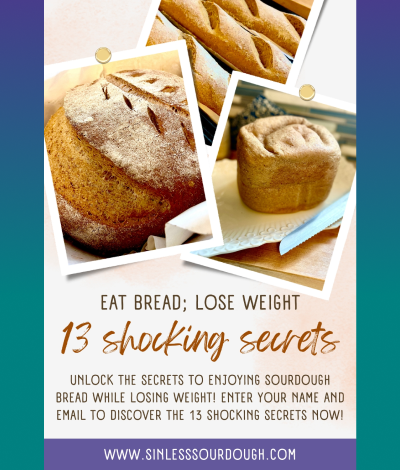Choosing the Best Alcohol-Free White Wine
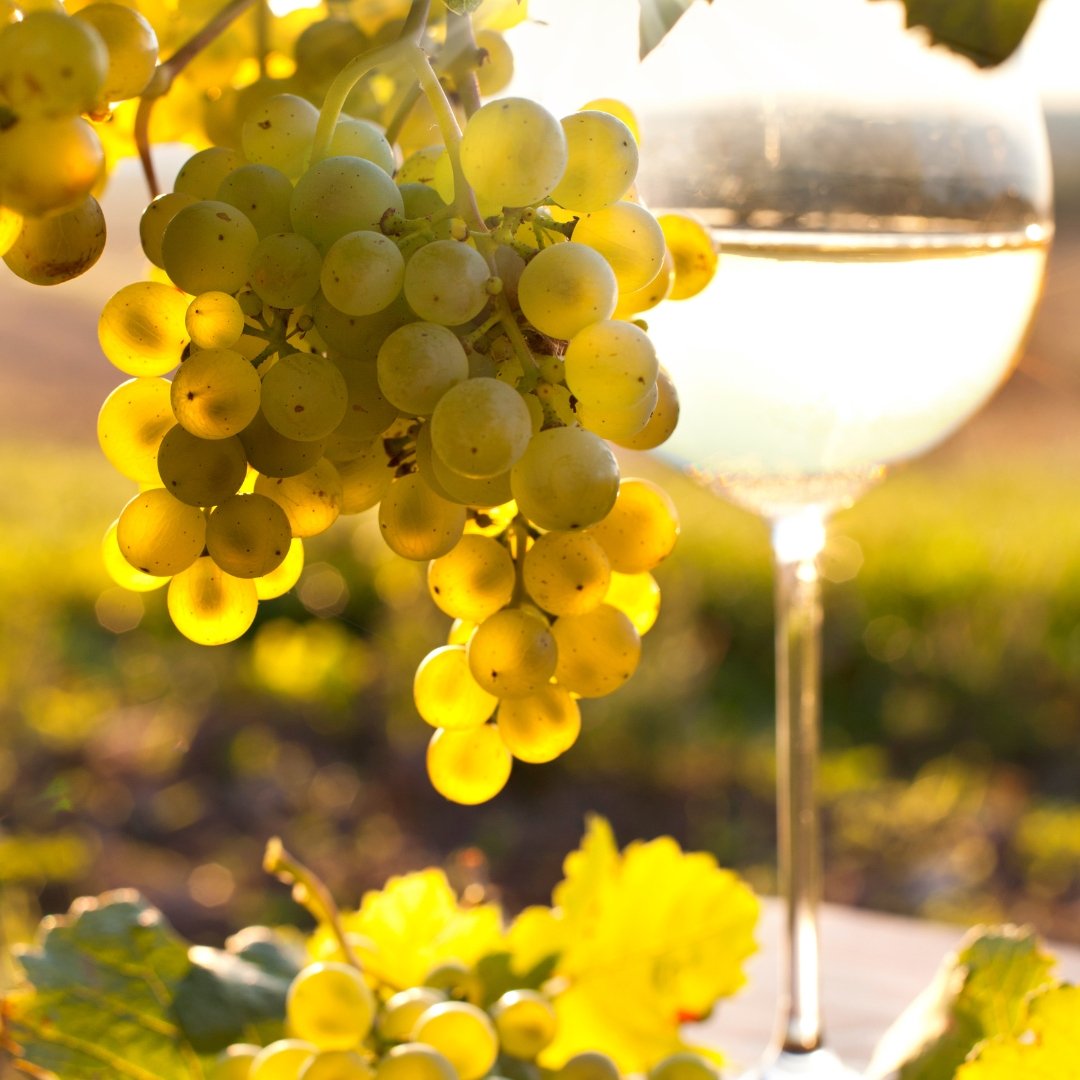
Alcohol-free white wine can be such a treat on hot, summer days. I’m so thrilled that I’m enjoying them again. I say “again” because I went through a long period of not drinking white wine due to the acidity. For some reason menopause altered my experience of the fresh acidity in white wine. Now in post menopause my perception of this acidity is back to normal. I’m so thrilled about this because alcohol-free white wine is so enjoyable in a variety of ways.
Hopefully by the end of reading this blog you’ll have a better understanding of how to choose alcohol-free white wines.
Key Takeaways:
- Alcohol-free white wine is made from fermented grapes with the alcohol removed, allowing you to enjoy the flavors and aromas of traditional wine without the intoxicating effects.
- It is made through dealcoholization methods such as vacuum distillation, reverse osmosis, and spinning cone technology, which remove alcohol while preserving the wine’s original flavors and aromas.
- While it can taste similar to regular wine, the absence of alcohol affects the body and mouthfeel, often making it lighter and sometimes sweeter. High-quality alcohol-free wines strive to closely replicate traditional wine flavors.
Health Benefits and Weight Loss:
- It offers health benefits such as lower calories and sugar, potential blood pressure reduction, cancer risk reduction, and improved sleep quality, without the negative effects of alcohol.
- Yes, it supports weight loss efforts due to its significantly lower calorie content compared to regular wine, aiding in calorie reduction and blood sugar control.
- Non-alcoholic white wine can have higher sugar content due to the dealcoholization process, but many brands offer low-sugar or sugar-free options. Always check the nutritional information.
Mocktails:
- Yes, it is excellent for creating refreshing and flavorful mocktails, such as White Wine Spritzers, Keto Sangria, and White Wine Mojitos, perfect for social gatherings.
- Alcohol-free white wine pairs well with keto-friendly foods like seafood (Sauvignon Blanc), roasted chicken (Chardonnay), Caesar salad (Pinot Grigio), and spicy dishes (Riesling).
Improved Sleep and Mood:
- It can improve sleep quality by avoiding the disruptions caused by alcohol, allowing for a more restful night’s sleep.
- It supports mental health by avoiding alcohol’s depressant effects, maintaining a balanced mood, and including mood-boosting botanicals, while also improving sleep quality and avoiding hangover-related mood issues.
What is Non Alcoholic White Wine?
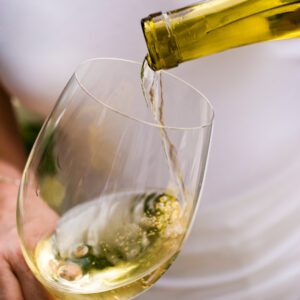
White wine without alcohol is a beverage made from fermented wine grapes, from which the alcohol has been removed. This process typically involves dealcoholization, where a traditional wine undergoes a method to extract the alcohol, all the while retaining its aromas and flavors. This dealcoholization process allows you to enjoy authentic wine with the sensory experiences that go along with it, without the intoxicating effects of alcohol.
How is Alcohol-Free White Wine Made?
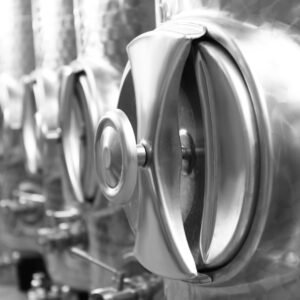
As mentioned, alcohol-free white wine undergoes the dealcholizatioin process. Common methods of dealcoholization include vacuum distillation, reverse osmosis, and spinning cone technology. These techniques aim to preserve the wine’s original and unique aromas and flavors, while eliminating the alcohol content. This extensive process results in a beverage that closely mimics traditional wine with alcohol.
Does Alcohol-Free White Wine Taste Like Regular Wine?

The taste of zero alcohol white wine can be similar to regular wine, but there are a few differences. The absence of alcohol can affect the body and mouthfeel of the white wine. For this reason, the winemaker must take into consideration and compensate for this lack of alcohol. Alcohol contributes to the weight and mouthfeel of wine, providing a sense of roundness and fullness that can be missing in non-alcoholic versions.
Winemakers employ several techniques to compensate for this lack of alcohol in non-alcoholic white wine and enhance their body and complexity.
Here are some key methods:
- Glycerol addition: Glycerol (also known as glycerine) is a sugar alcohol that can be added to increase the wine’s body and mouthfeel. It contributes to a wine’s texture, smoothness, and perceived sweetness without adding fermentable sugar. Glycerol is naturally present in wines as a byproduct of fermentation and can help smooth out rough edges in the wine’s profile.
- Oak barrel fermentation and aging: Fermenting and/or aging the wine in oak barrels can add complexity, depth, and texture to non-alcoholic wines. Oak can impart flavors like vanilla, toast, and spice, while also contributing to the wine’s structure and mouthfeel.
- Lees aging: This technique involves leaving the wine in contact with dead yeast cells (lees) after fermentation. Lees aging can add richness, creaminess, and complexity to the wine, enhancing its body and texture without adding alcohol or sugar.
- Malolactic fermentation: Although typically associated with red wines, some white wines undergo malolactic fermentation. This process converts tart malic acid to softer lactic acid, resulting in a creamier texture and fuller mouthfeel.
More Key Methods:
- Grape variety selection: Choosing grape varieties naturally high in aromatic compounds and with good structural elements can help compensate for the lack of alcohol. Varieties like Gewürztraminer, Muscat, or Viognier can provide intense aromatics and flavors.
- Extended skin contact: For white wines, allowing the juice to remain in contact with grape skins for a longer period before pressing can extract more phenolic compounds, adding structure and body to the wine.
- Blending: Winemakers may blend different grape varieties or wine styles to achieve a more complex and balanced non-alcoholic wine with improved body and texture.
- Concentration techniques: Methods like reverse osmosis or vacuum distillation can be used to concentrate flavors and aromas in the wine without adding alcohol.
- Use of tannins: While more common in red wines, some winemakers may add small amounts of tannins to white wines to increase structure and mouthfeel.
- Temperature control: Careful management of fermentation temperatures can help preserve delicate aromas and flavors, which become more critical in the absence of alcohol.
It’s important to note that while sugar addition is sometimes used to compensate for lack of body in non-alcoholic wines, this method is best avoided for those of us following Keto or low-carb principles. My goal is to discover wines with fabulous body that contain as little sugar as possible.
Is Alcohol-Free White Wine Healthy?

Alcohol-free white wine provides fabulous chealth advantages:
Some of these include:
- Hydration: Unlike alcoholic wine, which can dehydrate you, alcohol-free white wine can contribute to your daily fluid intake. It’s a refreshing option that can help keep you hydrated, especially during warm weather or social gatherings.
- Stress reduction: Enjoying a glass of alcohol-free white wine can provide a similar relaxation experience as its alcoholic counterpart, without the negative effects of alcohol on your nervous system. The ritual of sipping wine can help you unwind and de-stress after a long day.
- Better sleep quality: Alcohol can disrupt your sleep patterns, but alcohol-free white wine allows you to enjoy a nightcap without interfering with your rest. This can lead to improved sleep quality and better overall well-being.
- Weight management: Alcohol-free white wines typically have fewer calories than their alcoholic counterparts, making them a good choice for those watching their weight. For example, some non-alcoholic white wines contain only 10-50 calories per glass, compared to around 124 calories in a glass of regular white wine.
- Improved digestion: Some alcohol-free white wines may contain probiotics, which can support gut health and improve digestion.
- Enhanced cognitive function: By avoiding alcohol, you’re protecting your brain from its harmful effects. This can lead to better memory, concentration, and overall cognitive performance.
- Cardiovascular benefits: Like red wine, white wine contains antioxidants that may help improve heart health. Alcohol-free versions allow you to enjoy these benefits without the negative impacts of alcohol on your cardiovascular system.
- Reduced risk of certain cancers: By choosing alcohol-free white wine, you’re lowering your risk of developing alcohol-associated cancers, which is particularly important for those with a family history of cancer.
- Pregnancy-friendly option: Expectant mothers can safely enjoy alcohol-free white wine without risking harm to their developing baby.
- Social inclusion: Alcohol-free white wine allows you to participate in social drinking situations without feeling left out, supporting your social well-being while maintaining a healthy lifestyle.
Can Non Alcoholic White Wine Help With Weight Loss?

Drinking non-alcoholic white wine that is low in sugar can potentially help with weight loss as part of a balanced diet and healthy lifestyle.
Here’s why:
- Lower calorie content: Non-alcoholic wines generally have significantly fewer calories compared to their alcoholic counterparts. For example, while a standard glass of white wine typically contains around 120 calories, non-alcoholic alternatives can range from as low as 10-20 calories per glass to about 75 calories. This substantial calorie reduction can contribute to weight loss efforts when substituted for regular wine.
- Reduced sugar intake: Many non-alcoholic wines are now being produced with lower sugar content. For instance, some options like Giesen Sauvignon Blanc contain only 2g of sugar per 5 oz glass. Choosing low-sugar varieties can help minimize empty calorie consumption and prevent blood sugar spikes, which can be beneficial for weight management.
- Avoiding alcohol-related weight gain: Alcohol consumption can lead to weight gain due to its high calorie content and its tendency to increase appetite and reduce inhibitions around food choices. By opting for non-alcoholic wine, you can avoid these potential pitfalls.
- Maintaining social habits: Non-alcoholic wine allows individuals to participate in social drinking situations without consuming excess calories or alcohol. This can be particularly helpful for those trying to lose weight while maintaining their social life.
- Potential health benefits: Some non-alcoholic wines retain the polyphenols and antioxidants found in regular wine, which may offer health benefits without the negative effects of alcohol. These compounds could potentially support overall health and weight management efforts.
However, it’s important to note that simply drinking non-alcoholic white wine alone will not lead to weight loss. Stick to ones with as low sugar as possible and drink them in moderation. If the wine has some sugar, be sure to drink it with a meal that contains protein and healthy fat.
How Does the Sugar Content in Non-Alcoholic White Wine Compare to Regular White Wine?
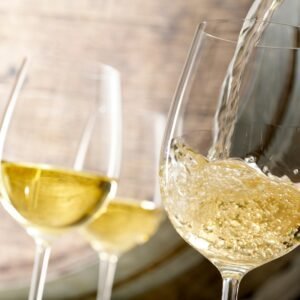
Non-alcoholic white wine generally contains more sugar than traditional white wine, but significantly fewer calories overall.
Here’s a comparison:
Regular White Wine:
- Typically contains around 1.4 g of sugar per 175ml glass.
- A dry white wine like German Riesling has approximately 1.4 g of sugar per 175ml glass.
- Dry white wines generally have 1 to 3 g of sugar per liter.
Non-Alcoholic White Wine:
- Contains about 2.8 – 4+ grams of sugar per 100ml, or 21-30 grams per 750ml bottle. My personal principle is to avoid any non alcoholic wines with more than 1.5 grams of sugar per ounce.
- The sugar can be higher than traditional white wine due to the winemaking process for non-alcoholic wines to compensate for the loss of body and weight. I discussed this earlier.
- There are non alcoholic whites with low sugar. It’s part of my journey to find these wines and let you know about them.
Despite the higher sugar content, non-alcoholic white wine has significantly fewer calories:
- A 100ml glass of regular white wine contains between 73 and 83 calories.
- The same amount of non-alcoholic white wine, such as Giesen Zero, has only around 13 calories.
The reason for this calorie difference is that alcohol contributes 7 calories per gram, while sugar contributes 4 calories per gram. Since non-alcoholic wine lacks the calorie-dense alcohol, it ends up with fewer total calories even with more sugar.
It’s worth noting that the sugar content in non-alcoholic wines can vary by brand and style. Some may contain less sugar, while others might have more. Always check the label or contact the manufacturer for specific nutritional information if you’re concerned about sugar intake.
I’m a fan of the Canadian non alcoholic wine company called ONES. Check out the banner in this blog.
What Are Some Low Sugar Non Alcoholic Whites You Can Try?
- The Expedition Series Non-Alc Verdejo Sauvignon Blanc: 24 calories and 0g sugar per 100mL
- Sovi Chenin Blanc: 10 calories and 1.3g sugar per 100mL
- Edenvale Semillon Sauvignon Blanc: 8 calories and 1.6g sugar per 100mL
- Giesen Sauvignon Blanc: 12.5 calories and 1.75g sugar per 100mL
- Brochet Zero Organic Sauvignon Blanc: 8 calories and 1.8g sugar per 100mL
- Noughty Blanc De-alcoholised White Wine: 17 calories and 2.0g sugar per 100mL
- Princess Alternativa Bianco Dry Non-Alcoholic White Wine: 17 calories and 2.6g sugar per 100mL
- Edanvale Pinot Gris: 13 calories and 2.8g sugar per 100mL
- Lautus Chardonnay: 20 calories and 2.8g sugar per 100mL
- Edenvale The Spanish Expedition Series Verdejo Sauvignon Blanc: 17 calories and 3.6g sugar per 100mL
- Edenvale Non-Alc Chardonnay: 18 calories and 3.9g sugar per 100mL
- Leitz Eins Zwei Non-Alc Riesling: 24 calories and 4.9g sugar per 100mL
- Edenvale Blanc de Blanc Premium Reserve: 23 calories and 5.2g sugar per 100mL
- Luminara Napa Valley Chardonnay Dealcoholized: 18 calories and 5.2g sugar per 100mL
- Le Petit Beret Virgin Sauvignon Blanc: 25 calories and 6.2g sugar per 100mL
Can You Use Non Alcoholic White Wine in Low-Carb Mocktails?
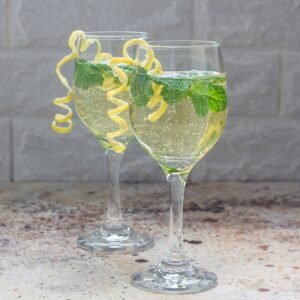
Yes, you can use non-alcoholic white wine in low-carb mocktails.
Here are some key points about incorporating non-alcoholic white wine into keto-friendly mocktails:
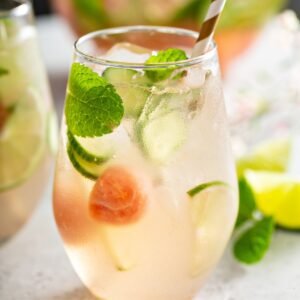
- Look for dry non-alcoholic white wines lower in carbs. Some options contain around 3g of carbs per 100ml serving. As mentioned, the Canadian wine company called ONES produces sparkling wines and table wines with zero carbs and zero sugar. Check out the banner on this blog.
- Use the non-alcoholic white wine as a base ingredient and then mix it with other low-carb ingredients like:
- Sparkling water or soda water
- Fresh lime or lemon juice
- Sugar-free flavored syrups
- Herbs like mint or basil
- Cucumber slices
- A popular low-carb mocktail using non-alcoholic white wine is a mock sangria. You can make this by combining the wine with green tea, water infuser of various flavors, and sparkling water.
- Be mindful of portion sizes, as even non-alcoholic wines contain some carbs. Measure out servings to keep the carb count in check.
- Check the nutrition label, as carb content can vary between brands. Opt for those with the lowest carb counts.
- Consider using just a splash of the non-alcoholic wine mixed with other low-carb ingredients to keep the overall carb count down while still getting the wine flavor.
- You can also use non-alcoholic gin or other zero-proof spirits as alternatives if you want an even lower carb count.
Alcohol-Free White Wine and Tequila Mocktails:
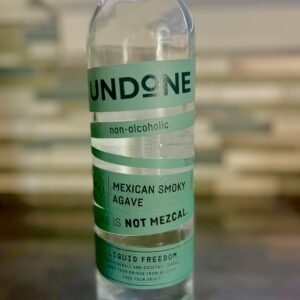
I discovered a delicious alcohol-free brand of spirits called “UNDONE.’ Undone Mexican Smoky Agave, also known as Undone No.6 Not Mezcal, is a non-alcoholic beverage designed to mimic the taste and aroma of tequila, specifically mezcal. This drink is produced by the German brand Undone and is intended for use in non-alcoholic versions of cocktails such as Margaritas or Tequila Sunrises.
Here’s the best part…Undone Mexican Smoky Agave has only 1.1 gram of sugars(and carbs) per 100 mL!
Description:
- Flavor Profile: The drink features a floral agave liquid with notes of cooked agave and pumpkin, a subtle smokiness, and hints of pear. The nose is characterized by fruit, flowers, and smoke, while the taste includes agave and a hint of pear, finishing with a short, bitter aftertaste.
- Ingredients: The main ingredients include water, agave juice, tequila flavor, citric acid, natural flavor, preservative (potassium sorbate), and smoke flavor.
- Nutritional Information: Per 100ml, it contains 27kJ/6 calories, 0g fat, 1.1g carbohydrates (all sugars), 0g protein, and 0g salt.
- Dietary Information: The drink is vegan, gluten-free, sugar-free, low-calorie, and made with only natural flavors.
Usage:
Undone No.6 Not Mezcal is not recommended to be consumed on its own but is best enjoyed as a mixer in various non-alcoholic mocktails to replicate the experience of traditional mezcal-based drinks
Here are 3 alcohol-free white wine-based mocktails that incorporate Undone Mexican Smoky Agave:
- White Wine Margarita
- Ingredients: 4 oz lime juice, 2 oz lemon juice, 1 squirt of orange flavored water enhancer, 4 oz triple sec, 1 bottle of non-alcoholic Sauvignon Blanc (chilled), and 4 oz Undone Mexican Smoky Agave. Taste the beverage. If it’s not sweet enough add more orange enhancer or liquid monk fruit sweetener.
- Instructions: Combine fall ingredients in a pitcher. Stir. Add ice cubes. Chill in the refrigerator until needed. Serve in wine glasses over ice. Garnish with a slice of fresh lime.
- Beyhive Bellini
- Ingredients: 1 bottle of ONES Sparkling White. Few squirts of peach water enhancer. Juice from 1 lemon. 4 ounces Undone Mexican Smoky Agave.
- Instructions: Add all ingredients to a pitcher. Add ice. Refrigerate until needed. Serve in wine glasses over ice with slice of fresh lime.
- White Wine Mojito
- Ingredients: 1 bottle (750 ml) of ONES Sparkling white wine, 2 cups soda water, ½ cup fresh lime juice (~4 limes), ¼ cup of sugarfree syrup, 1 oz fresh cilantro, 4 ounces Undone Mexican Smoky Agave. Fresh mint for garnish.
- Instructions: In a pitcher, combine all ingredients. Add ice. Refrigerate until needed. Pour into wine glasses over ice, garnished with sprig of fresh mint.
How Can I Incorporate Low-Sugar Zero Alcohol White Wine Into My Keto Meal Plan?
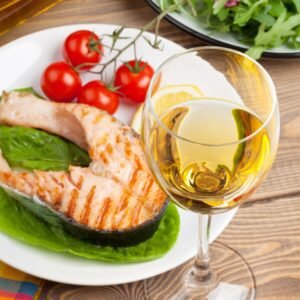
You can easily include low-sugar alcohol free white wine into your keto meal plan without derailing your focus. Use the wine to create refreshing spritzers by mixing with soda water and a splash of lime juice. You can also use alcohol-free white wine in cooking to deglaze pans or add flavor to sauces without worrying about added carbs.
Will Drinking Low-Sugar Alcohol-Free White Wine Kick Me Out Of Ketosis?
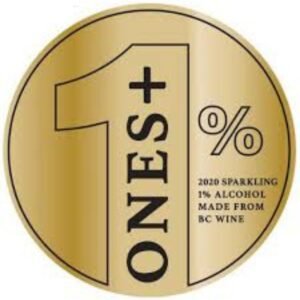
Drinking low-sugar alcohol-free white wine is unlikely to kick you out of ketosis.
Here’s why:
- Low carb content: Alcohol-free white wines typically contain very few carbohydrates, usually less than 4 grams per serving. Personally, I would not take the chance of a glass of non alcoholic white wine kicking me out of ketosis. So avoid any wines with any carbs and sugar. ONES Sparkling Wines possess zero carbs and zero sugar. You can drink any of their products. Check out the banner in this blog.
- No alcohol interference: Regular alcoholic wine can pause ketosis as your body prioritizes metabolizing the alcohol over fat. However, alcohol-free wine doesn’t contain ethanol, so it won’t interfere with your body’s ketone production. Again, stick to non alcoholic white wines with zero carbs and zero sugar, such as ONES.
- Sugar content: As long as you choose a zero carb and zero sugar variety, it shouldn’t disrupt ketosis. Be sure to check the label.
- Moderation is key: Even though alcohol-free wine with zero carbs and zero sugar is unlikely to kick you out of ketosis, it’s still important to consume it in moderation.
- Hydration benefits: Unlike alcoholic wine, which can dehydrate you, alcohol-free white wine like ONES Sparkling wines can contribute to your daily fluid intake without the dehydrating effects of alcohol.
(Click this link for a 10% discount on ALL Ones Sparkling Wines)
Safest Option:
While alcohol-free white wine with zero carbs and zero sugar is a safer option for maintaining ketosis compared to regular wine, it’s always best to monitor your individual response. Some people may be more sensitive to even a trace amounts of carbs. If you’re concerned, you can test your ketone levels after consuming alcohol-free white wine to see how it affects you personally.
Remember, the best beverages for a ketogenic diet are water, tea, and coffee without added sugars. However, if you enjoy the taste of wine and want to avoid alcohol, ONES can be a keto-friendly option when consumed in moderation. Since it contains zero carbs and zero sugar and no alcohol, ONES won’t spike your blood sugar or interfere with your body’s fat-burning state.
How Does Low-Sugar Alcohol-Free White Wine Compare to Regular Wine in Terms of Carbs and Calories?
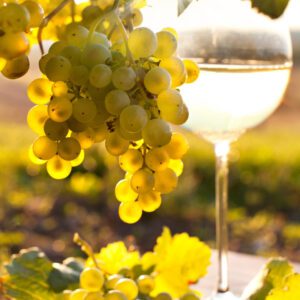
Low-sugar, alcohol-free white wine generally has fewer carbs and calories compared to regular wine.
Here is a detailed comparison:
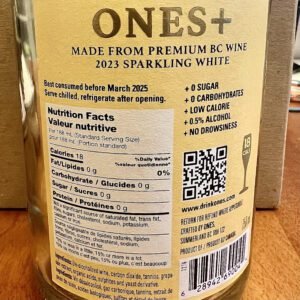
Carbohydrates:
- Regular White Wine: Typically contains about 2-4 grams of carbs per 5-ounce serving, depending on the dryness of the wine. Dry white wines like Sauvignon Blanc have around 2 grams of carbs per 5-ounce serving.
- Alcohol-Free White Wine: Often has slightly higher residual sugar to compensate for the absence of alcohol, but still generally contains fewer carbs than regular wine. The exact carb content can vary by brand, but it is usually lower due to the absence of alcohol. Hunt for alcohol-free white wines with as low sugar as possible. As I say time and again, I stick to non alcoholic wines that are under 1.5 grams of sugar per ounce and consume these ones with protein and healthy fat.
Calories:
- Regular White Wine: A 5-ounce glass of regular white wine contains approximately 100-120 calories, with the majority of these calories coming from alcohol (7 calories per gram) and some from residual sugars;
- Alcohol-Free White Wine: Contains significantly fewer calories because it lacks alcohol. For example, an 8-ounce glass of ONES Sparkling Wine has only 24 calories per 250 mL.
Summary:
- Carbs: Alcohol-free white wine may possess fewer carbs than regular white wine, although it may have slightly higher residual sugar. Always read the label.
- Calories: Alcohol-free white wine has significantly fewer calories compared to regular white wine due to the absence of alcohol.
This makes alcohol-free white wine a favorable option for those looking to reduce their calorie and carb intake while still enjoying the taste of wine.
(Click this link for a 10% discount on ALL Ones Sparkling Wines)
Why Cook with Low-Sugar Alcohol-Free White Wine?
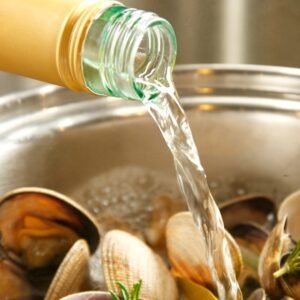
Adding wine to a dish during the cooking process accomplishes several important things:
- Enhances flavor: Wine adds depth, complexity, and nuanced flavors to dishes. Cooking concentrates the wine’s flavors, infusing the food with its unique characteristics.
- Tenderizes meat: The acidity in wine can help break down the outer layers of meat, making it more tender and juicy when used in marinades or braises.
- Deglazes pans: Wine is excellent for deglazing, helping to dissolve and incorporate the flavorful browned bits (fond) stuck to the bottom of pans after searing meats or vegetables.
- Balances flavors: Wine’s acidity can brighten dishes and balance out rich or fatty flavors. It can also counteract sweetness in some recipes.
- Adds moisture: In braising and steaming, wine provides moisture to keep foods tender while imparting flavor.
- Creates sauces: Wine reduces to form the base of many sauces, adding richness and complexity.
- Improves texture: In some dishes like fondue, wine can help prevent cheese from becoming stringy or seizing up.
- Concentrates flavors: As wine cooks down, its sugars and acids concentrate, intensifying flavors in the dish.
- Keep Carbs and Sugars Low: Low-sugar wine is a good option for Keto cooking as it contains minimal carbs and no alcohol. Always hunt for wines with as few carbs and sugar as possible, even for cooking.
How Does Low-Sugar Alcohol-Free White Wine Support My Keto Weight Loss Goals?
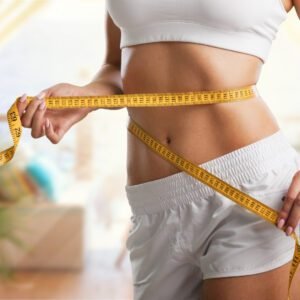
WEIGHT LOSS ON THE KETOGENIC DIET
Low-sugar alcohol-free white wine can be a great ally in your keto weight loss journey. By choosing this option, you’re avoiding the empty calories and carbs found in traditional wine, which can hinder Ketosis and your progress. It allows you to participate in social drinking situations without compromising your diet. Plus, the absence of alcohol means you’re less likely to experience cravings or make poor food choices, helping you stay on track with your keto lifestyle and weight loss goals.
How Does Alcohol-Free White Wine Affect Sleep Quality?

Alcohol-free white wine can have several positive effects on sleep quality compared to regular white wine:
- No disruption of sleep cycles: Unlike alcoholic wine, alcohol-free wine does not interfere with your natural sleep cycles or disrupt REM sleep. This allows you to get more restorative, high-quality sleep throughout the night.
- Better sleep quality: Alcohol-free wine does not cause the poor sleep quality associated with alcoholic beverages. Studies have shown that even moderate alcohol intake can reduce sleep quality by 24%.
- No increased wakefulness: Alcohol can cause you to wake up frequently during the night as your body metabolizes it. Alcohol-free wine avoids this issue, allowing for more continuous, uninterrupted sleep.
- Avoids exacerbating sleep disorders: Alcohol can worsen conditions like sleep apnea and insomnia. Alcohol-free wine does not have these negative effects on existing sleep disorder.
- No hangover effects: By avoiding alcohol, you eliminate next-day hangover symptoms like headaches, nausea, and fatigue that can impact your sleep-wake cycle.
- Maintains healthy sleep habits: Alcohol-free wine allows you to enjoy a nightcap without disrupting your regular sleep schedule or sleep hygiene practices.
- Potential relaxation benefits: Some alcohol-free wines may still provide mild relaxation effects from compounds like resveratrol, potentially aiding in falling asleep without alcohol’s disruptive impacts.
Can Alcohol-Free White Wine Improve Mental Health?

Alcohol-free white wine may offer some mental health benefits, though research specifically on alcohol-free white wine is limited.
Here are some potential ways it could positively impact mental wellbeing:
- Enhanced relaxation and social experiences: Enjoying alcohol-free white wine can contribute to relaxation and positive social interactions without the intoxicating effects of alcohol. Sharing a bottle with friends or family can create a convivial atmosphere, promoting mental wellbeing and stress reduction.
- Better sleep quality: Unlike alcoholic wine, which can disrupt sleep patterns, alcohol-free wine allows for better quality sleep. Improved sleep is crucial for mental health, as it helps with memory consolidation, mood regulation, and overall cognitive function.
- Improved mood and reduced anxiety: By avoiding alcohol, which can act as a depressant, alcohol-free wine may help maintain more stable moods. Additionally, the absence of alcohol eliminates the risk of alcohol-induced anxiety or depression.
- Greater self-control: Choosing alcohol-free wine removes the reduced inhibitions and compulsive behaviors associated with alcohol consumption. This can lead to better decision-making and a sense of control over one’s actions, potentially boosting self-esteem and mental wellbeing.
- Antioxidant benefits: White wine, even in its alcohol-free form, contains antioxidants that can help protect against oxidative stress. While more commonly associated with red wine, these compounds may have neuroprotective effects that could support long-term brain health.
- Hydration: Proper hydration is important for cognitive function and mood. Unlike alcoholic beverages that can lead to dehydration, alcohol-free wine can contribute to overall hydration, potentially supporting mental clarity and emotional balance.
- Reduced risk of alcohol-related mental health issues: By choosing alcohol-free options, individuals can avoid the negative mental health impacts associated with alcohol consumption, such as increased risk of depression, anxiety disorders, and cognitive decline.
How Does the Aging Process Differ for Non-Alcoholic White Wine Compared to Traditional Wine?

The aging process for non-alcoholic white wine differs from traditional wine in several key ways:
- Shorter aging period: Non-alcoholic white wines typically undergo a much shorter aging process compared to traditional wines. While traditional white wines may be aged for months or years, non-alcoholic versions are usually aged for only a few weeks or months at most.
- Limited oak aging: Traditional white wines can be aged in oak barrels, which imparts distinct flavors and aromas. Non-alcoholic white wines may undergo oak aging, depending on the winemaker’s preference. I have heard that oak aging with the absence of alcohol makes it more challenging to extract beneficial compounds from the wood.
- Oxidation concerns: Non-alcoholic white wines are more susceptible to oxidation due to the lack of alcohol, which acts as a natural preservative. As a result, the aging process must be carefully controlled to prevent unwanted oxidation.
- Limited bottle aging potential: Traditional white wines can often improve with bottle aging, developing more complex flavors over time. Non-alcoholic white wines generally have limited bottle aging potential due to the lack of alcohol and are best consumed relatively soon after production.
- Use of alternative preservation methods: To compensate for the lack of alcohol’s preservative effects, non-alcoholic white wines may rely more heavily on other preservation methods such as sulfites or sterile filtration during the aging process.
- Temperature-controlled aging: Non-alcoholic white wines are typically aged in temperature-controlled environments to maintain freshness and prevent spoilage, as they lack the natural protection of alcohol.
Can Non-Alcoholic White Wine Develop Complex Flavors Over Time?

Non-alcoholic white wine can develop some complexity in flavor, but it generally does not age or evolve over time in the same way that traditional alcoholic wines do.
Here are the key points to consider:
- Fermentation process: Non-alcoholic wines undergo a controlled fermentation process, usually in stainless steel tanks. Stainless steel fermentation allows them to develop some of the flavors associated with traditional wines. This initial fermentation contributes to the wine’s refreshing taste with bright acidity. This type of fermentation can create intense fruit flavors or complex fruit flavors on the nose and palate.
- Flavor enhancements: Winemakers employ various techniques to enhance the flavor of non-alcoholic wine, including aging in oak barrels, adding natural extracts or essences, and blending different grape varieties. These methods help achieve a more nuanced and complex flavor profile.
- Limited aging potential: Unlike traditional wines, non-alcoholic white wwines do not continue to develop complex flavors over time through bottle aging. The absence of alcohol, which acts as a preservative and contributes to the aging process, limits their ability to evolve further.
- Blending for complexity: Some producers use blending techniques to balance tannins, oak notes, and fruit flavors in their non-alcoholic red wines. This approach helps create a more complex flavor profile in the final product.
- Oakiness: While I have not read this anywhere, I would assume that adding oak chips to the wine to add that oaky flavor would be less expensive and contribute to the wine’s complexity rather than aging in oak barrels.
- Additives and flavor rebuilding: After dealcoholization, many winemakers use FDA-approved additives to rebuild mouthfeel and flavor. For example, Thomson & Scott’s Noughty brand uses tannins, mannoproteins, and small amounts of sugar to rebuild the body and structure of their non-alcoholic wines.
- Ongoing improvements: As the non-alcoholic wine market grows, producers are investing more time and attention into improving their processes, resulting in better-tasting, higher-quality products with enhanced sensory experiences.
Are There Any Side Effects of Drinking Non-Alcoholic White Wine?
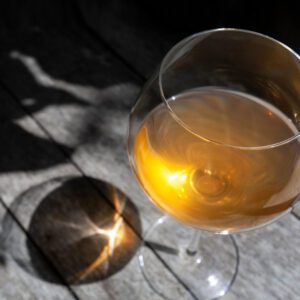
Non-alcoholic white wine offers several health benefits, including the absence of hangovers, potential lowering of blood pressure, reduced risk of certain cancers, fewer calories, and improved sleep and mood. However, it’s not entirely free from potential side effects. The presence of sulfites, which are used as preservatives, can cause headaches and allergic reactions in some individuals. Additionally, other additives or preservatives in non-alcoholic wines may lead to adverse reactions in sensitive people. Despite these potential drawbacks, the side effects of non-alcoholic white wine are generally less severe compared to those associated with alcoholic wine. As with any dietary change, it’s advisable to consume non-alcoholic white wine in moderation and be aware of your body’s reactions to it.
Can You Get Drunk on Alcohol-Free White Wine?

No, it is virtually impossible to get drunk on alcohol-free white wine due to its extremely low or non-existent alcohol content. Most alcohol-free wines contain less than 0.5% ABV, which is not enough to cause intoxication. Even consuming large quantities would not result in a noticeable effect. This makes alcohol-free white wine a safe option for those who want to avoid the effects of alcohol, such as designated drivers, pregnant women, or individuals who abstain from alcohol for health or personal reasons.
It’s important to note that non alcoholic wine doesn’t mean zero alcohol. To be considered (and marketed) as non alcoholic, the wine should have an ABV of just 0.5 percent – the same as a bottle of kombucha. Wines with 0.5% alcohol by volume can potentially be problematic for some individuals, triggering cravings or posing challenges for alcohol abstinence. Therefore, always exercise caution and consult your healthcare professional before consuming any such beverages.
Is Alcohol-Free White Wine Halal or Kosher?
Alcohol-free white wine can be considered halal or kosher, but it depends on the specific product and its production process. For a wine to be halal, it must contain no alcohol and be free from any ingredients or processes forbidden in Islamic law. Some alcohol-free wines meet these criteria, but it is best to check for halal certification. For kosher certification, the wine must be produced under the supervision of a rabbi and meet specific dietary laws. Many alcohol-free wines are available with kosher certification, making them suitable for those following Jewish dietary laws.
Can You Drink Alcohol-Free White Wine While Pregnant?

Yes, alcohol-free white wine is generally considered safe to drink during pregnancy, as it contains little to no alcohol. Most alcohol-free wines have less than 0.5% alcohol by volume (ABV), which is a negligible amount. However, it is always best to consult with a healthcare provider before consuming any wine products during pregnancy. Some brands offer completely alcohol-free options, ensuring zero alcohol content. Drinking alcohol-free white wine can allow pregnant women to enjoy the social and sensory aspects of wine without the risks associated with alcohol consumption. But it’s important to note that if you are pregnant, you should first consult your doctor before consuming alcohol-free wine.
What Are the Best Brands of Alcohol-Free White Wine?
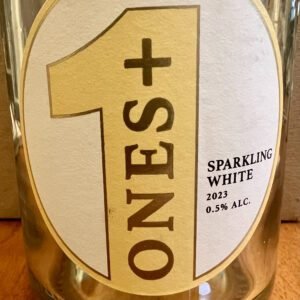
Several brands are renowned for their high-quality alcohol-free white wines. Again, the most important point is to read the back label to ensure the wine is low in carbs and sugar to support your Keto diet or low-carb lifestyle. My favorite is ONES because it has zero carbs and zero alcohol.
Some of the best include Thomson & Scott Noughty, They produce an array of alcohol-free white wines, including Chardonnay. Lautus is another brand that makes an array of low-sugar wines. There are many. Just be sure to read the nutritional label on the back of the wine bottle.
Can You Get Non-Alcoholic Versions of Specific White Wine Varieties Like Chardonnay or Sauvignon Blanc?
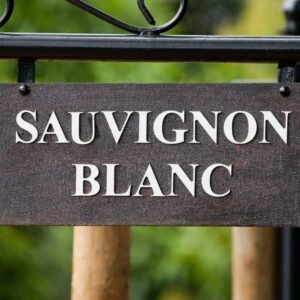
Yes, you can find non-alcoholic versions of specific white wine varieties such as Chardonnay, Sauvignon Blanc, Pinot Grigio, and Riesling. Many reputable brands offer these varieties to cater to different taste preferences. For example, Lautus makes an outstanding non-alcoholic Chardonnay. These wines are crafted to retain the characteristic aromas and flavors comparable to their alcoholic counterparts, providing a familiar and enjoyable experience for wine enthusiasts who prefer to avoid alcohol.
How Long Does an Open Bottle of Alcohol-Free White Wine Last?

An open bottle of alcohol-free white wine typically lasts 3-5 days when refrigerated. Like regular wine, it is best to store it in the fridge and use a wine stopper to minimize oxidation. The absence of alcohol, which acts as a preservative, means that alcohol-free wine can spoil more quickly. To enjoy the best flavors, consume the wine within this timeframe. If the wine starts to taste off or sour, it is best to discard it. Proper storage can help maintain the wine’s quality and extend its shelf life slightly.
If your sparkling alcohol-free white wine loses its bubbles, no need to fret. You can still enjoy the wine as if it’s a table wine or use it in a recipe.
What’s the Difference Between Non-Alcoholic and De-Alcoholized White Wine?
On the back of the bottle, the back label should state, “De-Alcoholized Wine.” This phrase let’s you know that wine grapes underwent fermentation, creating traditional wine. The wine was then ‘de-alcoholized.’
According to the FDA, the label may also include the term, “non-alcoholic wine.” On the FDA.com website under the section called policy, it states, “…
“…The term “dealcoholized” or “alcohol-removed” should appear in the statement of identity, immediately preceding either the term “wine” or the standard of identity [27 CFR 4.21] designation of the type of wine from which it was derived, such as “burgundy.” The qualifying words “dealcoholized” or “alcohol-removed” should appear in letters equal in size to “wine” or to the standardized name on the principal display panel of the label. Where a specific designation is used, such as “dealcoholized claret” or “alcohol-removed burgundy,” the product must be true to source type as defined by BATF regulations….
..To ensure that consumers are not misled as to the alcohol content of the product, the statement of identity should be followed by the declaration, “contains less than 0.5 percent alcohol by volume.” FDA considers use of the terms “dealcoholized” and “alcohol-removed” in the statement of identity of a reduced alcohol wine product to be misleading if the alcohol content exceeds 0.5 percent by volume.
We do not object to the presence of the additional label claim “non-alcoholic” on labels of dealcoholized wines. However, the term “non-alcoholic” should not be used in lieu of the term “dealcoholized” or “alcohol-removed” as the sole qualifier in the statement of identity of the wine product.
FDA does not consider the terms “non-alcoholic” and “alcohol-free” to be synonymous. The term “alcohol-free” may be used only when the product contains no detectable alcohol.”
FDA POLICY
How Many Calories Are in Alcohol-Free White Wine?

Alcohol-free white wine typically contains significantly fewer calories than its alcoholic counterpart. On average, a serving of alcohol-free white wine has about 10-50 calories, compared to 120-160 calories in regular wine. This lower calorie content makes it an attractive option for those looking to reduce their caloric intake.
The reduced calorie count is primarily due to the absence of alcohol, which is calorie-dense. This makes alcohol-free white wine a suitable choice for those on calorie-restricted diets. It is also for those aiming to maintain a healthy weight. Remember tracking calories is as important as tracking carbs on the Keto diet or within your low-carb lifestyle.
What Keto and Low-Carb Dishes Complement Zero Alcohol White Wine?

Here is a list of Keto and Low-Carb Recipes that harmonize with alcohol-free white wine:
Bacon-Wrapped Salmon Asparagus (Heart Healthy)
Salmon and Brussels Sprouts (Heart Healthy)
Tilapia Parmesan (Heart Healthy)
Smoked Salmon Rolls (Heart Healthy)
Montreal Chicken Quarters (Heart Healthy)
- UNUSUAL KETO INSTANT POT RECIPES FOR 2025 - April 27, 2025
- Boost Your Keto Diet with These Non-Alcoholic Wine Hacks - April 27, 2025
- 10 Unique & Healthy Mocktails You Need to Try - April 27, 2025


